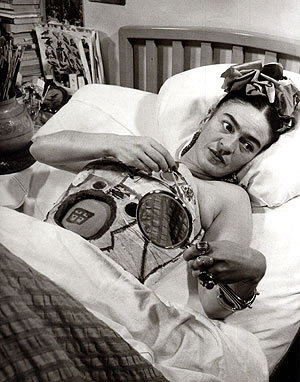.
 |
| Left: Frida Kahlo; Right: Salma Hayek as Frida |
Anyway, I happened to pick up a recent DVD of the Frida movie of 2002, starring Salma Hayek and Afred Molina, arguably two of the most talented actors of the times. (I'm not giving you a link; you can buy the movie, rent it at Netflix or Amazon, or go to a theater to see it if it is shown near you.)
This (perhaps surprisingly) is the first movie that I have seen with Salma Hayek in it, and I was amazed. In my estimation, she was Frida; either their personalities matched well, or ... what can I say. When I see Charlton Heston as Michaelangelo, I am totally persuaded. Perhaps Salma Hayek was convincing because she is Mexican--indeed Frida Kahlo was half Hungarian Jewish by birth, which could explain some of the wonderful passion and creativity that flowed from her (children of mixed ethnicity are often very creative, for cultural or genetic reasons; who can tell?).
To know the historical person Magdalena Carmen Frieda Kahlo y Calderón, one has to have met her, or at least, read her writings, and contemporary accounts of her friends and acquaintances. In the movie, we see her through the eyes of the director, primarily (Julie Taymor), and Salma Hayek herself. Having only seen the movie, my remarks are about the character portrayed there.
Frida Kahlo (the name Kahlo is possibly a Mexicanization of a German-Jewish name such as Kähler) in the movie comes across as a person suffering chronic pain, but whose warmth and vitality is largely irrepressible. Through careful choice of material, Julie Taymor and her writing team (see the credits on the IMDB website) have tried to depict the major forces that shaped the personality and the motivations of this remarkable woman. But more amazingly wonderfully, the design of the movie steals from the work of both Frida Kahlo and Diego Rivera; the choice of colors, the rich clay-reds, the vibrant blues, the dull browns, greens and greys that work so beautifully in the backgrounds of murals are used skillfully, to immerse one in a sort of Frida-Diego-ness that is satisfying. One is transported to that time and place (Mexico in the early years of the 2oth century), and this sort of experience always leaves its mark on me.
Frida was an important figure in Western Culture of the 20th century. She was, naturally, interested in gender issues, even if gender issues were not her central preoccupation. The women's movement of the last quarter of the 20th century fastened on figures such as Frida, as an example of (possibly unintentional) victimization. However, feminism and women's homosexuality were inextricably related in the 90's, and feminists whose concerns did not extend to gay rights were embarrassed by Frida's ambiguous sexual orientation. At the time the movie was made, most people were far less threatened by bisexuality in general. We had successfully disconnected pedophilia from homosexuality, and in the light of the 21st century, some of Frida's escapades seem far less weird. The problem, indeed, is to reconstruct their weirdness in context.
The person who emerges is warm, ultimately patient, loyal, motherly, affectionate, and surprisingly outward-focused, for one who suffered lifelong pain. Salma Hayek could not help but portray Frida as an essentially lovable person, even if when the subject was alive, she may have been more palatable at a distance than up close in person.
[Added later: the movie I saw was in English, and in the present-day idiom. Not knowing what is come down to us of Frida's style of speech, I cannot comment on how apt the choice of voice for Frida is, in the movie. But she speaks a fluent "Hey guys," sort of idiom, which seems appropriate for a person who frequented bars and hung out with the boys, and the bohemians of the time. Is it more important that we should be true to the facts, or that we should be given a representation of a person that we can understand? Perhaps the memory of an historical person who was difficult to understand is not well served by a biographical film that makes that person accessible--and I can imagine even that observation being far from axiomatic. But in the case of Frida, I doubt that she was difficult to understand. Perhaps it was some of the ways in which she was transparent that were difficult to tolerate by her contemporaries, but there is little doubt that she was greatly loved in her lifetime.]
In addition to the brilliant performances of Salma Hayek and Alfred Molina, we have a host of the best and brightest in the acting world contributing beautifully understated performances to support them: I recognize Geoffrey Rush, Ashley Judd, Antonio Banderas, Valeria Golino, Lila Downs, Mia Maestro, and even Didi Conn. (Please forgive me if I fail to identify some names with which I'm not personally familiar.)
In keeping with the art world of Frida Kahlo, the movie has surreal elements that underscore the artistic settings. The stinging analyses of contemporary socialists and Marxists are nevertheless affectionate and plausible. (It is startling to realize how modern American intellectualism has most of the Marxism purged from it; how is this possible? Philosophy has taken on some of the dogmatic aspects of Theology, I'm afraid.) Again and again one is startled into remarking how various sights and visions Frida sees and has find their way into her paintings. The movie may fall short for those who knew Frida personally, but to me, it is a work of art.
Arch









